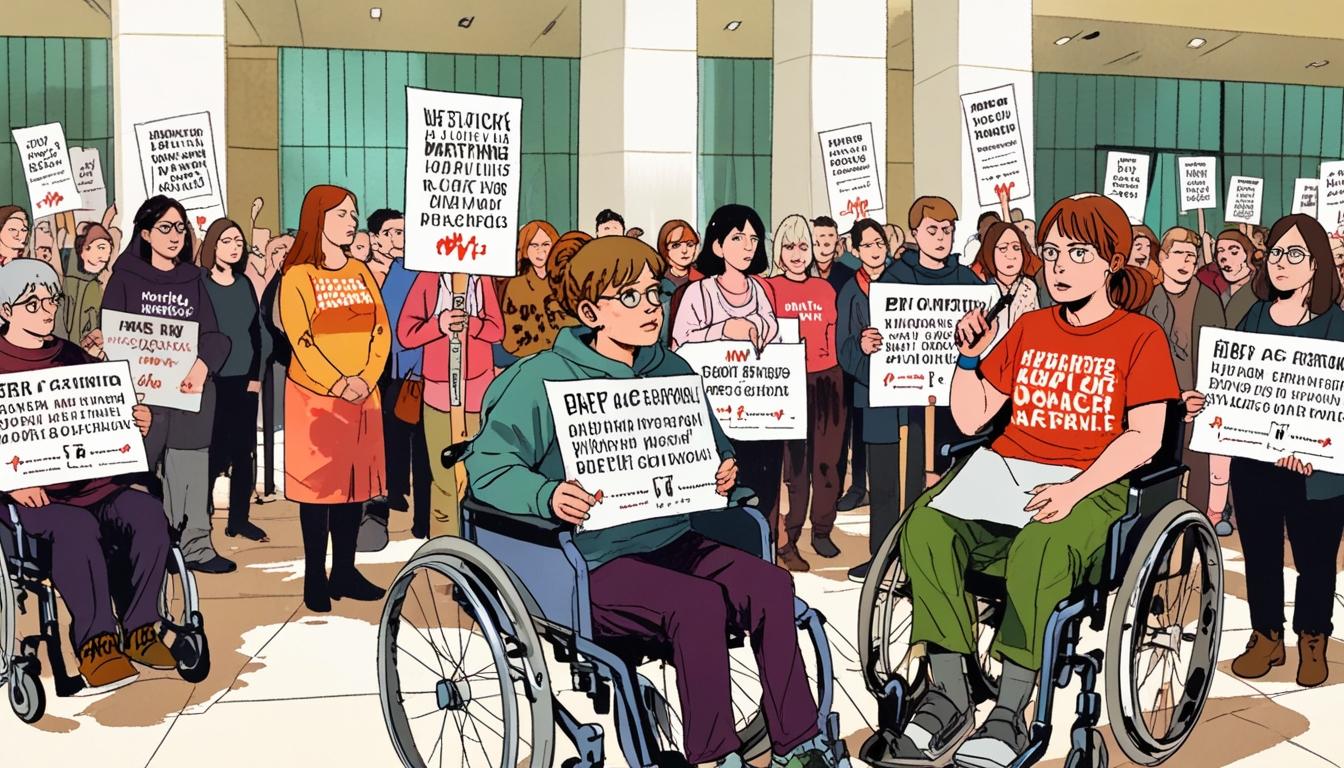Disabled Activists Challenge Government Consultation, Claim It's a "Sham"
In a bold act of activism, disabled individuals from Manchester Disabled People Against Cuts (DPAC) recently disrupted a consultation event hosted by the Department for Work and Pensions (DWP) in Manchester. Accusing the government of conducting a "sham" consultation regarding its controversial Pathways to Work green paper, the activists successfully demanded a platform to express their concerns regarding the entire set of 22 proposals, rather than the limited selection put forth by the DWP.
The demonstration took place at the Crowne Plaza hotel, where activists gathered en masse, occupying the foyer and refusing to vacate until they were granted an opportunity to address attendees. Despite the presence of law enforcement, the protest remained peaceful, and no arrests were made. The activists were particularly frustrated by the government’s decision to engage only with ten of the proposals outlined in the green paper, leaving significant concerns—such as Labour's proposed cuts to personal independence payment (PIP)—unaddressed.
After an intense hour-long standoff, the participants secured an audience with DWP civil servants, allowing Rick Burgess, a key figure in the protest, to lead a discussion. He urged the attendees to vote on whether they wished to explore the entire green paper rather than the narrowly defined topics dictated by officials. The overwhelming support for this broader dialogue signaled a clear rejection of the governmental agenda, prompting many activists to fill the consultation tables and assert control over the proceedings.
The discussions that followed delved into critical issues facing disabled individuals today, including the contentious proposal to abolish the work capability assessment and replace it with a unified assessment for determining eligibility for both PIP and the health element of universal credit. Further complicating the landscape, the government plans to freeze the value of the health element until 2029-30, which would see new claimants receiving significantly reduced benefits. The most alarming aspect of the green paper is the intention to cut PIP expenditures by more than £4.5 billion, stipulating that recipients must achieve a minimum score of four points on at least one assessment activity to qualify for essential daily living components.
Burgess articulated the group's position succinctly, asserting, “Our message to the minister is to abandon the green paper… unless they are letting all the disabled people in to talk about all of the problems the green paper is going to make worse, then it’s just like asking us to co-operate in our own abuse.” This sentiment reflects a broader frustration with a consultation process perceived as fundamentally flawed—one that does not genuinely engage disabled people in shaping policies affecting their lives.
Another activist, Luke Beesley, echoed this sentiment, stating, “Anyone can do this. You don’t need loads of experience, you don’t need hundreds of people behind you… just disabled people showing up, being gobby and being assertive; that can get you in the room.” Such grassroots activism highlights the potential for ordinary individuals to impact public discourse and governmental policies.
The protest, however, did not receive a warm reception from the DWP, which issued a statement reiterating its commitment to reforming a system it described as "fundamentally broken." The Department’s spokesperson voiced a desire to create a welfare system that offers substantive support to those in need, attributing ongoing discussions and consultations to these noble aims. Yet, the stark contrast between the DWP's claims and the activists' lived experiences raises troubling questions about the true nature of the government’s objectives.
While the Pathways to Work consultation is presented as an initiative to improve disabled people's circumstances, various legal challenges and findings suggest otherwise. A recent High Court ruling determined that the DWP had acted unlawfully by not adequately communicating the cost-saving motives behind proposed benefit reforms. This lack of transparency has raised concerns that many disabled individuals would face reduced financial support, risking their independence and wellbeing.
Manchester DPAC's recent actions underscore a growing resolve among disabled activists to reclaim dialogue around their rights and needs. The strong rejection of the green paper by participants is indicative of wider discontent with current policies and their implications for disability rights in the UK. As they continue to rally for inclusion and accountability, their message is clear: disabled voices must be not just heard, but prioritised in conversations that will shape their futures.
##Reference Map:
- Paragraph 1 – [1], [2]
- Paragraph 2 – [1], [5]
- Paragraph 3 – [2], [6]
- Paragraph 4 – [2], [4]
- Paragraph 5 – [1], [6]
- Paragraph 6 – [3], [4]
- Paragraph 7 – [5], [6]
Source: Noah Wire Services
